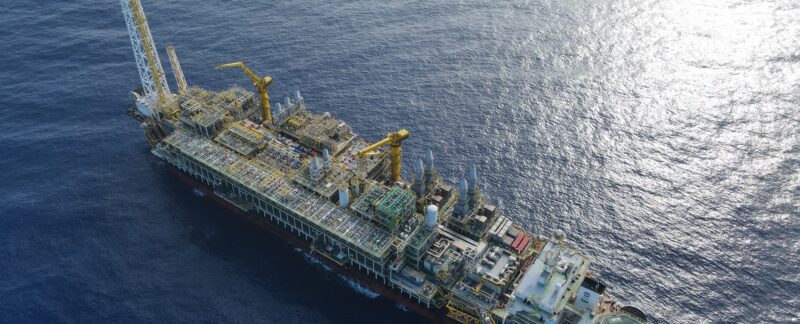On April 30, Petrobras started producing oil and natural gas through the FPSO Guanabara, the first definitive production system installed in the Mero field, in the pre-salt layer of the Santos Basin. The platform, of the FPSO type (floating oil and gas production, storage and transfer unit), has the capacity to process up to 180 thousand barrels of oil and 12 million m3 of gas, which represents 6% of the production operated by Petrobras, contributing to the expected growth of the company's production. Mero is the third largest pre-salt oil field (behind Búzios and Tupi).
The platform arrived at the Mero field at the end of January 2022. During this period, it was connected to subsea wells and equipment, and underwent final tests before starting production. In the first wave, 6 producing wells and 7 injectors will be connected to the FPSO. The platform is expected to reach peak production by the end of 2022.
“The FPSO Guanabara is the most complex oil production unit operating in Brazil. The implementation of a project with this technology is the result of more than a decade of learning in the pre-salt layer and of the integrated action between Petrobras, partners and suppliers. The project was designed to combine production capacity, efficiency and reduction of greenhouse gas emissions”, highlights João Henrique Rittershaussen, director of Production Development at Petrobras.
The platform weight is 102,443 tons (equivalent to 258 Boeing 747s); height of 172 meters, equivalent to 4.6 statues of Christ the Redeemer and length of 332 meters, or three football fields. In addition, it has a power generation capacity of 100 megawatts, enough to supply a city of 330,000 inhabitants.
Built and operated by Modec, the unit is located more than 150 km off the coast of the state of Rio de Janeiro in a water depth that reaches 1,930 meters. In all, three more definitive platforms are scheduled to come into operation in the Mero field within the horizon of Petrobras' Strategic Plan 2022-2026.
The FPSO Guanabara has gas reinjection systems, where the production of gas with a content of 45% of carbon dioxide (CO2), after its own consumption in the FPSO, will be all reinjected into the deposit in order to maintain pressure and improve recovery. of oil, in addition to reducing the release of CO2 into the atmosphere. The gas reinjection will be done alternately with the water injection (Water Alternating Gas - WAG).
Additionally, the Mero field is developing an unprecedented technology for the separation of CO2-rich oil from oil on the seabed, for its reinjection from the seabed, reducing the amount of gas that reaches the FPSO, thus increasing the availability of oil FPSO and project efficiency.
The Mero 1 project is part of one of the most robust geological CO2 Capture, Use and Storage programs in the world - called CCUS. These initiatives are in line with Petrobras' commitment to reduce carbon intensity by 32% in the Exploration and Production area by 2025.
The Mero unitized field is operated by Petrobras (38.6%), in partnership with Shell Brasil (19.3%), TotalEnergies (19.3%), CNPC (9.65%), CNOOC Petroleum Brasil Ltda ( 9.65%) and Pré-Sal Petróleo S.A -PPSA (3.5%), as Union representative in the non-contracted area.


